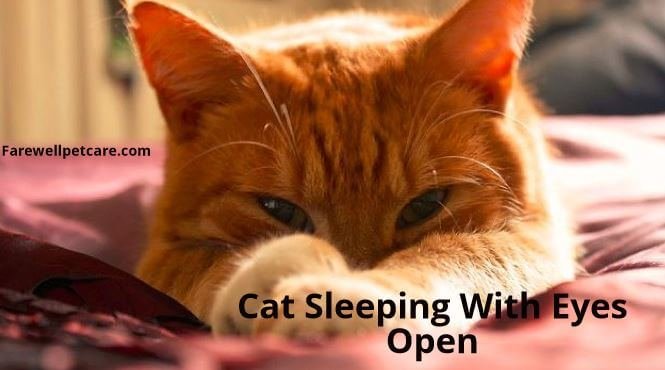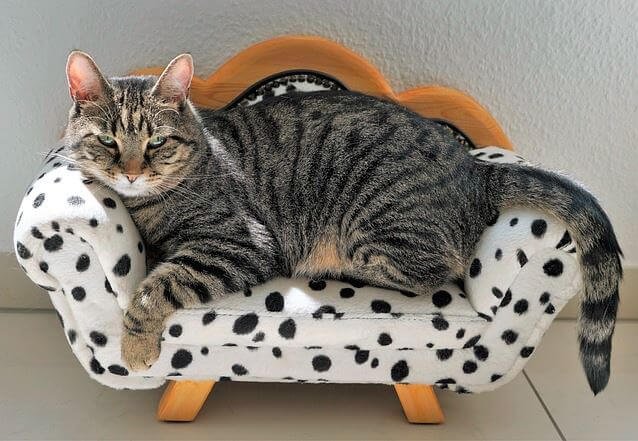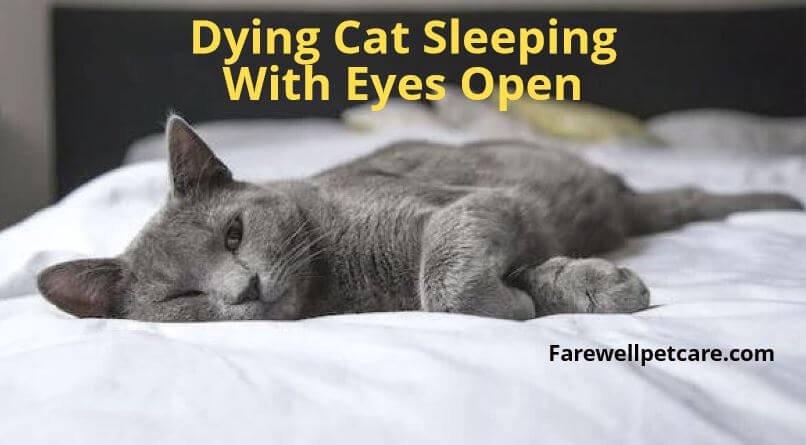A dying cat sleeping with eyes open is not only petrifying but can also prompt vital questions in your mind. Consequently, you might wonder why your cat is showing this behavior and what you should do about it.
Dying cats instinctively sleep with their eyes open to be wary of dangers in their surroundings. This commonly occurs in the light slow-wave sleep stage. Also, some dying cats can become too clingy and sleep eye-open to monitor their owners.
In this article, I’ll discuss in depth the main reasons dying cats sleep with their eyes open. I’ll also show you the telltale signs of a dying cat, explain why cats die with eyes open, and much more. Keep reading!
Dying Cat Sleeping With Eyes Open: 3 Causes and Solutions
It’s pretty common for cats, whether dying or healthy, to sleep eye-open. Here are the main reasons:
1. Instinctual Behavior
Cats were wild animals back in the day before domestication. And even though they were hunting experts, other animals hunted them too. Therefore, sleeping with open eyes is an evolutionary adaptation that cats developed to survive in the wild.
In doing so, they stayed wary of their surroundings while resting. These guarding instincts are still active many centuries after domestication.
And since cats sleep between 12 and 16 hours daily, depending on their age and health, it only makes sense that a creature who spends much of its life unconscious would evolve to stay alert even in sleep.
In the same breath, a cat in its dying stages often sleeps with open eyes because they instinctively understand they’re more prone to ‘predators’ than healthy cats.
Find Out: Do Cats Want to Be Alone When Dying? 8 Crucial Signs to Look For
2. Separation Anxiety

A cat tends to bond with its owner strongly and can suffer separation anxiety when left alone for extended periods.
A study found that cats emotionally connect with their humans for security. They get less stressed and more relaxed immediately when their owner returns from a short absence.
The research also shows that some bonded felines follow their owners everywhere and sleep with their eyes open to track their movement. In this case, if the owner goes to a different place, the cat would possibly wake up and follow them just to stay close.
You probably know that while most cats nearing death tend to hide, others can become too attached to their owners for support, hence sleeping with open eyes.
3. Light Sleep
Like humans, cats undergo two sleeping stages—REM (rapid eye movement) and SWS (slow wave sleep).
Various studies have found SWS associated with felines sleeping with their eyes open.
When you observe your dying cat resting with eyes open, they’re likely in the light slow wave sleep stage and can wake up with the slightest disturbance.
Unfortunately, there’s nothing much you can do about a dying cat sleeping with open eyes, as it’s normal. You can, however, seek medical advice from a professional if you’re worried about it.
How Do You Tell If a Cat Is Nearing the End of Its Life?
Watching your cat nearing the end of its life is heartbreaking. It is, therefore, best to know what to anticipate so you can have peace of mind and prepare for the hurdles and obligations that come with it.
Here are the common signs of a dying cat to consider:
Lack of Appetite
Like humans and other animals, it’s normal for felines to lose their appetite when approaching death. They instinctively know that digesting food requires energy and may be too weak and exhausted to consume anything.
Some prescription drugs may also alter a cat’s sense of smell and taste, decreasing its interest in food.
A dying cat will eventually show signs of anorexia, including extreme weight loss, weakness, sunken eyes, and loose skin.
Lethargy
Reduced activity is another sign of a dying cat.
As a feline approaches the end of its life, it becomes more sluggish and sedentary due to decreasing energy levels.
Besides general inactivity, lethargic cats can also show the following symptoms:
- Sleepiness or drowsiness
- Disinterest or unresponsiveness to the surrounding
- Behavioral issues like aggression and eliminating outside the litter box
- Fever
- Difficult breathing, etc.
Decreased Heart Rate
Healthy cats’ heart rate ranges between 140 to 220 beats per minute (bpm). However, one nearing the end of life will experience a dropping heart rate because of its failing heart.
You can confirm if your cat’s heart rate is low using the following procedure:
- Place your palm over their left side, right behind their front limb.
- Use a stopwatch or smartphone to record the number of beats within 15 seconds.
- Multiply the recorded figure by four to get the number of beats per minute.
- Evaluate whether your cat’s heart rate is healthy or abnormal.
Labored Breathing
A cat’s weakening heart also causes its lungs to work less efficiently, pumping less oxygen into the heart. This causes an abnormal breathing pattern.
Your cat will begin breathing rapidly as they fight for oxygen. This will eventually be followed by slow, difficult breathing due to fluid filling their lungs.
Healthy cats take about 20 to 30 breaths a minute. If yours seems to be breathing fast and heavily or taking fewer breaths, it may be nearing its end.
Decreased Body Temperature

A cat’s normal body temperature ranges between 100℉ and 102.5℉ (37.78℃ and 39.17℃).
A dying cat will have a body temperature below 100°F (37.78℃). This is because the body temperature starts dropping when the heart weakens, and the organ systems begin collapsing.
If you suspect your kitty is dying, you can check its temperature using an ear or rectal thermometer. Alternatively, you can touch their paws to feel if they’re cold.
Changes in Smell and Appearance
Naturally, cats are diligent groomers who devote their time to it. But, they grow weary when nearing the end of life and stop grooming themselves.
A dying cat appears filthy and unkempt. They may have a greasy and shabby-looking coat, excessive dandruff, and scaly skin. Long-haired felines may develop mats.
Similarly, they may have a noticeable unpleasant smell. This is due to the build-up of toxins from their deteriorating organs. The odor becomes worse eventually because they can’t eliminate the toxins.
Seeking Solitude
Felines usually withdraw and hide when gravely ill. This is an instinctive behavior that domesticated cats adopt from their wild counterparts.
A dying cat in the wild naturally understands that they’re more prone to predators. As a result, they always hide to protect themselves.
Your cat may instinctively seek solitude in new spots, such as a secluded room, under the furniture, or outdoors. Refusing to appear for routine positive events like play and mealtimes is another telltale sign.
If you suspect your feline baby is ill, get them checked by a vet immediately. Most signs of imminent death are also symptoms of serious illness that could be treated successfully with proper medication.
Therefore, don’t conclude that because your cat shows these symptoms, they’re certainly dying; there could be hope.
Do Sick Cats Sleep With Their Eyes Open?
Cats that sleep with their eyes open are not necessarily sick. Similarly, not all sick cats sleep with open eyes.
In many cases, this quirky behavior shouldn’t be a cause for concern—most felines snooze eye-open. Experts state that this trait is more prevalent in senior cats.
While this behavior is typical for cats, it’s still best to keep an eye on them. Although rarely, sleeping eye-open can signify a medical issue, including the following:
Dry Eye Syndrome
Scientifically called Keratoconjunctivitis Sicca (KCS), dry eye syndrome is a condition causes by lack of tear production.
Tears are essential in keeping the eye moist and removing debris. Without it, the cornea and the surrounding tissues become dry and inflamed.
While most cats with KCS can sleep with their eyes shut, some can’t due to discomfort.
There are several factors that cause dry eye syndrome in cats. They include underlying health conditions such as viral and bacterial infections or traumatic events such as surgery and radiation.
Eye Injury
Hyperactive cats are likely to suffer eye injuries.
Rough plays and fights can result in nictitating membrane laceration or an ulcerated cornea. Consequently, shutting the eye could be unbearably painful, making a cat sleep eye-open.
Common signs of trauma in the eye include redness, watery eyes, discharge, inflammation, and noticeable scratches.
Contaminants in the Eye
Contaminants like sand, thorns, or chemicals can enter your kitty’s eyes and cause painful sores or even eye infections. The pain can prevent them from closing their eyes when sleeping.
So, if you suspect your cat is sleeping with their eyes open due to a medical issue, consult a vet immediately to provide a way forward.
Why Were My Cat’s Eyes Open When He Died?
Your cat’s eyes were open when he died due to lack of muscular control to shut them.
For eyes to shut, some muscles must contract while others relax. However, when a cat dies, muscle relaxation occurs naturally, but contraction doesn’t because the cat can no longer control those muscles.
Final Words
Even though it seems weird, cats sleeping with open eyes is absolutely okay. They’re hardwired to be alert at all times. This instinct is heightened in dying cats as they’re more vulnerable to risks.
However, if you’re concerned about your feline friend sleeping with their eyes open, get them checked by a vet to rule out any medical issues.


This was very interesting and helpful, thanks! My 18-year-old cat is sick and near the end of his life, and it was disturbing to me that he can’t seem to relax and sleep as he has for years. Sounds like it’s at least partly this open-eyed sleep that I had never heard of!